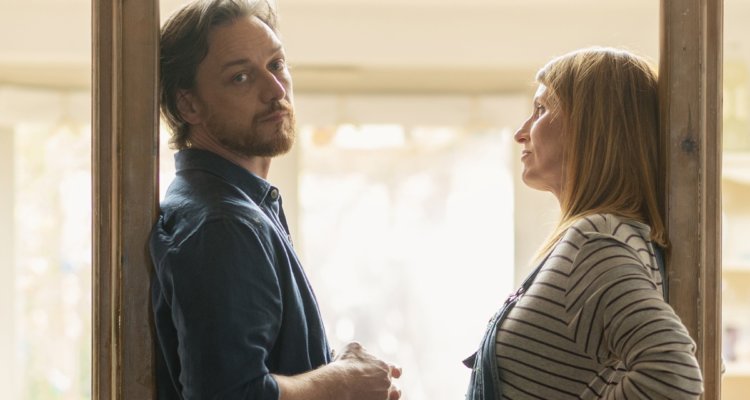One of the more fully formed portraits of life during lockdown, Stephen Daldry and Dennis Kelly’s rapid-fire, fourth-wall-breaking, two-hander “Together” trades the overt sentimentalism of Daldry’s previous film work—“The Reader,” “Extremely Loud and Incredibly Close,” etc.—for a darkly comedic study in the ups and downs of a single couple as they contend with the fracturing of their relationship amidst the pandemic. Featuring pointedly jagged performances from James McAvoy and Sharon Horgan, the only characters in film besides their son Arthur (Samuel Logan), who moves around the film, and frame’s, periphery, “Together” is an occasionally slight, but nevertheless riveting showcase for the actors and Kelly’s decidedly unsentimental script.
Beginning in the early stages of lockdown, Daldry’s film comes on fierce, as McAvoy and Hogan—nameless stand-ins for any number of bickering couples in the past year—talk directly to the camera, expounding upon their lingering hatred of each other. Coupled with a son, but almost binaries in every other sense—including pointed political jabs—the two talk over around their relationship, the love they initially had and have seemingly lost. Staged in long, fluid takes, McAvoy and Hogan circle around each other, going about their daily routine as they rhetorically ambush the other, hoping to have the unforeseen viewer briefly align with them. Issues come up—a failed early date, her mother’s declining health, the state of his business—that represent through-lines, as Daldry jumps through over a year of lockdown between the two, but the main narrative thrust remains in the couples; battered relationship or, what McAvoy’s character astutely calls “the love that exists beyond hate.”
Running a bit less than 90 minutes, “Together” never leaves the house or allows the couple to interact outside of the relationship between themselves and the camera. As such, the entire film is a series of discreetly staged monologues and dialogues, directly told to the audience. Moving from early-2020 to mid-2021, the film also tracks the increasing deaths—and eventual vaccinations—through title cards, contextualizing the outside world through de-personalized statistics. Each new scene begins with a catch-up, as one of the two characters tells us what has happened not only in their lives but in the UK more generally, before gradually shifting into discussions of their changing romantic situation.
While the eventual outcome of the couple’s relationship is, perhaps, a bit obvious, Kelly’s script doesn’t overplay sentimentality, creating two fully defined characters and a relationship that is equal parts toxic and loving. For a film built around only two characters, Daldry wisely lets McAvoy and Horgan chew through the material, cross-talking to the point where it becomes a bit disorienting to figure out who is saying what and where we might align. McAvoy has rarely been given the opportunity to be this cruel, and he seemingly relishes the opportunity. Horgan matches him well, creating a conflicted portrait of a woman who is contending with the seeming implosion of her picturesque life.
Unlike the similarly staged “Lockdown,” which awkwardly fused pandemic martial dysfunction with a late-act jewelry heist, “Together” doesn’t allow these characters the type of outward catharsis that Steven Knight and Doug Liman’s film was all too quick to get to. Instead, Daldry and Kelly are content to provide snapshots into the ever-changing relationship between the characters, willing to let their off-kilter love for each other grow and wither in equal proportion.
One wonders, however, what the half-life of these types of films are, as “Together,” like any number of pandemic projects—“Coastal Elites,” “7 Days,” “Homemade”—was filmed in a short span of 10 days with little to no contextual distance from the pandemic that we will seemingly never get out of. Even so, judged against the burgeoning genre of “locked down drama,” “Together” represents a welcome tonal shift, unafraid to showcase the nastiness associated with isolation and, paradoxically, becoming one of the most humane things Daldry has directed. [B+]
“Together” arrives in theaters on August 27 before hitting VOD on September 17.

